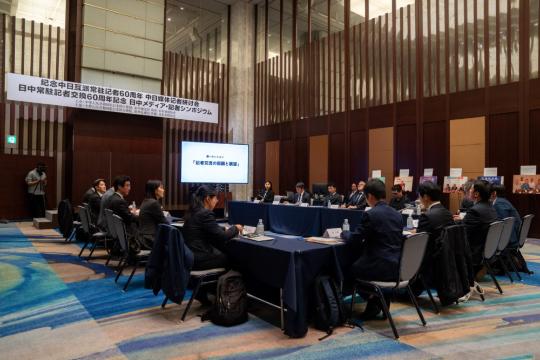Media exchange hailed at Tokyo event
Officials and experts from China and Japan called for the media to help foster a constructive and stable bilateral relationship that aligns with the demands of the new era at a Sino-Japanese journalists' symposium held in Tokyo on Monday.
At the symposium commemorating the 60th anniversary of the exchange of resident correspondents between China and Japan, they also called on the media to provide accurate, objective reporting and promote mutual understanding between their people.
The event was organized by the Chinese embassy in Japan and Xinhua News Agency, with support from the Japan Newspaper Publishers and Editors Association.
On April 13, 1964, then Chinese Premier Zhou Enlai met with Japanese politician Kenzo Matsumura, which led to an agreement on the mutual dispatch of journalists between the two countries. On Sept 29 that year, a delegation of seven Chinese journalists led by Xinhua reporter Ding Tuo arrived in Tokyo, while nine Japanese journalists landed in Beijing the same day.
This milestone marked the first formal exchange of resident correspondents between the two nations.
Liu Deyou, former vice-minister of China's Ministry of Culture, praised the milestone in a video message played at the symposium's opening ceremony.
He said the exchange of journalists was made possible by the vision and persistent efforts of earlier generations of Chinese leaders and farsighted Japanese politicians who sought to break the diplomatic deadlock.
Solid foundation
Liu also noted that establishing memorandum trade offices and the journalist exchange marked a significant shift from purely civil interactions to semiofficial exchanges, laying a solid foundation for the normalization of Sino-Japanese relations in September 1972.
Wang Jinfu, director of Xinhua's Asia-Pacific Regional Bureau, said 60 years of mutual journalist exchanges demonstrates that the media serves as a vital bridge for fostering mutual understanding, particularly between China and Japan.
Chinese Ambassador to Japan Wu Jianghao emphasized that resident correspondents build a bridge of information between the two countries, bearing the important responsibility of enhancing mutual understanding among their people.
Wu noted that Sino-Japanese relations are currently at a pivotal stage of development.
He urged journalists from both countries to serve as advocates for stronger Sino-Japanese relations by understanding the broader trajectory of bilateral ties, promoting accurate perceptions, and supporting mutual benefits and shared development.
Tsuyoshi Hasebe, vice-president of the Japan Newspaper Publishers and Editors Association, emphasized the pivotal role journalist exchanges play in fostering mutual understanding between the people of China and Japan. He noted that reporting from both sides has provided valuable insights into each other's nations.
"Through our coverage, we can create dynamic exchanges between the two countries," Hasebe said.
Akiko Ikuina, Japan's parliamentary vice-minister for foreign affairs, highlighted the symposium's profound significance in advancing constructive and stable Japan-China relations.
"Both government officials and journalists must make tireless efforts to convey the right message to our citizens," Ikuina said.
Shoichi Kondo, a member of Japan's House of Representatives, highlighted the need to objectively convey the realities, viewpoints, and genuine circumstances of each country through the exchange of resident journalists.

